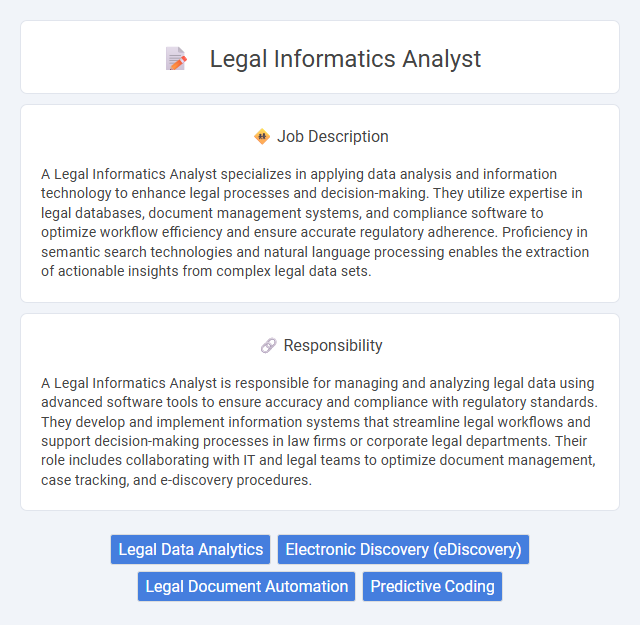
A Legal Informatics Analyst specializes in applying data analysis and information technology to enhance legal processes and decision-making. They utilize expertise in legal databases, document management systems, and compliance software to optimize workflow efficiency and ensure accurate regulatory adherence. Proficiency in semantic search technologies and natural language processing enables the extraction of actionable insights from complex legal data sets.
Individuals with strong analytical skills and an interest in both law and technology are likely suitable for a Legal Informatics Analyst role. Those comfortable working with complex data and legal systems may find success in this position. People lacking attention to detail or an understanding of legal processes might struggle to perform effectively in this job.
Qualification
A Legal Informatics Analyst must possess strong analytical skills and a deep understanding of legal systems combined with expertise in information technology, including database management and legal software. Proficiency in programming languages like Python or SQL, along with experience in data analysis and legal research tools, is essential. A bachelor's degree in law, computer science, or a related field, often supplemented with certifications in legal informatics or data science, significantly enhances job qualifications.
Responsibility
A Legal Informatics Analyst is responsible for managing and analyzing legal data using advanced software tools to ensure accuracy and compliance with regulatory standards. They develop and implement information systems that streamline legal workflows and support decision-making processes in law firms or corporate legal departments. Their role includes collaborating with IT and legal teams to optimize document management, case tracking, and e-discovery procedures.
Benefit
Legal Informatics Analysts likely enhance efficiency through the integration of technology and legal processes, which may reduce time spent on data management and improve accuracy. They probably contribute to better decision-making by providing data-driven insights, helping legal teams identify patterns and manage risks more effectively. This role might also offer opportunities for career growth in the intersection of law and information technology, potentially increasing job satisfaction and marketability.
Challenge
Legal Informatics Analysts likely face challenges related to integrating complex legal databases with emerging technologies while ensuring compliance with evolving regulations. The role probably demands continuous adaptation to advancements in AI and data analytics to improve legal processes and decision-making. Navigating the intersection of law and technology may present difficulties in balancing accuracy, security, and ethical considerations.
Career Advancement
A Legal Informatics Analyst plays a crucial role in bridging the gap between law and technology by managing legal data systems and optimizing information workflows. Advancing in this career often involves gaining expertise in data analytics, machine learning, and regulatory compliance, leading to positions such as Senior Legal Technologist or Legal Data Scientist. Professionals who continuously update their skills in emerging legal technologies and attain certifications in legal project management or cybersecurity can accelerate their career growth within law firms or corporate legal departments.
Key Terms
Legal Data Analytics
Legal Informatics Analysts specializing in legal data analytics leverage advanced data mining, machine learning, and natural language processing techniques to extract actionable insights from vast legal datasets. They analyze case law trends, contract structures, and regulatory patterns to support informed decision-making and risk mitigation strategies within law firms and corporate legal departments. Mastery of legal databases, coding languages such as Python or R, and visualization tools enhances their capability to transform complex legal information into predictive analytics and operational efficiencies.
Electronic Discovery (eDiscovery)
Legal Informatics Analysts specializing in Electronic Discovery (eDiscovery) manage and analyze large volumes of digital evidence to support litigation and regulatory compliance. They utilize advanced eDiscovery tools and data processing techniques to identify, preserve, and review relevant electronic documents efficiently. Expertise in data privacy laws, information governance, and technology-assisted review (TAR) is essential for optimizing the legal discovery process.
Legal Document Automation
A Legal Informatics Analyst specializing in Legal Document Automation leverages advanced software to streamline the creation, management, and review of legal documents, significantly reducing manual effort and increasing accuracy. Expertise in tools such as contract lifecycle management (CLM) systems, artificial intelligence (AI)-powered drafting software, and natural language processing (NLP) enhances efficiency in compliance and risk mitigation. Proficiency in data analysis, legal databases, and workflow optimization supports seamless integration of automated solutions within law firms and corporate legal departments.
Predictive Coding
A Legal Informatics Analyst specializing in Predictive Coding leverages machine learning algorithms to enhance document review efficiency in e-discovery processes. This role involves analyzing vast legal datasets to develop predictive models that identify relevant documents, reducing manual workload and accelerating case resolution. Expertise in natural language processing and data analytics is critical for optimizing the accuracy and performance of predictive coding systems.
 kuljobs.com
kuljobs.com